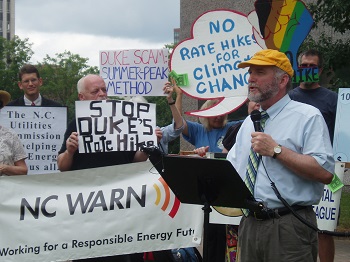 NC WARN regularly intervenes in dockets at the NC Utilities Commission in which Duke Energy is requesting rate increases. This page pertains mostly to the 2017/18 rate hike dockets, but contains interesting photos and resources from the 2013 rate hike, too.
NC WARN regularly intervenes in dockets at the NC Utilities Commission in which Duke Energy is requesting rate increases. This page pertains mostly to the 2017/18 rate hike dockets, but contains interesting photos and resources from the 2013 rate hike, too.
2017/18 Rate Hike Proceedings
Duke Energy Carolinas Talking Points
Duke Energy Carolinas has requested a rate hike of $611 million in additional annual revenue, an overall rate increase of 12.8%. As part of this, DEC is seeking a 16.7% increase for residential customers, with the basic customer charge (the minimum you pay regardless of how little electricity you use) increasing from $11.80 to $17.79. As a result, the average residential bill would increase $18.72 / month if the rate hike is approved. This would be a tremendous hardship for families least able to afford it.
Of the $611 million annual increase, $101 million is for the newly constructed Lee natural gas plant in South Carolina and two solar facilities; $53 million is for the abandoned Lee Nuclear Station; and another $182 million for other capital projects. DEC is also seeking $135 million for coal ash mitigation and cleanup already spent and another $201 million for ongoing coal ash costs. Another $60 million is for smart meters.
These annual costs are partially offset by $64 million in deferred taxes and another $57 million in other changes in revenue.
This large rate hike request is a symptom of Duke Energy’s business model of constructing fracked gas-burning power plants and raising rates while stifling the growth of renewable energy. If Duke is allowed to continue on this track, there will be many more rate increases.
Among the concerns NC WARN has identified in the application for a rate increase:
In addition to seeking $135 million more each year for COAL ASH CLEAN-UP activities so far, Duke seeks to charge customers $201 million per year for future clean-ups – with no end date specified. NC WARN believes state laws do not allow Duke Energy to charge customers for costs resulting from unlawful activities, lawsuit settlements, or criminal convictions.
As noted above, the exorbitant rate increase would be highest for RESIDENTIAL CUSTOMERS, with the toughest impact on low- and fixed-income families due to a 50% increase in the residential basic service charge along with the rate increase, and an average monthly bill increase of $18.72. This means that a low-income family may have to sacrifice food, water, or any other fundamental needs to pay for electricity. Currently, many such families cannot afford to pay for the electricity bill alone and need to seek public assistance.
DEC wants customers to pay $53 million more each year for its failed, ten-year effort to license and build two new reactors at the LEE NUCLEAR STATION in South Carolina. Even after the Utilities Commission put a cap of $120 million on the amount DEC could spend for licensing and pre-development in 2011, DEC went ahead and spent $520 million, and now wants customers to pay for the entire project, including interest. If any other company invests in a project and overspends, that company bears the burden and cannot pass the excessive costs of its failure to the ratepayers.
A Further Concern: Backroom Deals
NC WARN is urging state regulators to break their pattern of settling rate cases and mergers with Duke Energy behind closed doors. The long-running practice undercuts the public wellbeing and gives the utility exactly what it really wants – covered by a thin pretense of regulatory oversight. We are also calling on Attorney General Josh Stein not to be drawn into backroom negotiations, and instead to stand up for the public against allowing Duke’s attempt to recover billions in coal ash clean-up costs that were caused by its executives’ illegal actions.
In a letter sent to the attorney general and Chris Ayers, head of the NC Utilities Commission’s Public Staff, we noted that in the past several rate cases, “premature settlement has made involvement by the public and intervenors almost meaningless.” Last year, for the fifth straight time in a major Duke Energy case, the Public Staff undermined fair process by cutting a backroom deal with the utility; that time, they didn’t even await input from the public or parties to the case.
Duke Energy Progress Talking Points
Summary
Duke Energy Progress has requested a rate increase of:
- 14.9% average across all customers
- 16.7% increase for residential customers
- 15.4% increase for small general service customers
- 12.9% for medium general service customers
- 13.4% for large general service customers
The average residential bill would increase $17.80 if the rate hike is approved.
Duke Energy Progress has asked for a 2.3% increase in customers’ fuel rates in addition to this rate hike. Together, the increases come to 19 percent for residential rates and would increase bills by an average $20 per month, a tremendous hardship for families least able to afford it.
Details
This large rate hike request is a symptom of Duke Energy’s business model of constructing fracked gas-burning power plants and raising rates while working with the Koch brothers to stifle the growth of renewable energy. If Duke is allowed to continue on this track, there will be many more rate increases.
And if Duke Energy’s massive expansion of fracked gas succeeds without considerably stronger scrutiny and challenge, the hyper-potent methane spewing unburned from gas wells, pipelines and power plants will be a key factor in driving humanity into runaway climate chaos.
Among the concerns NC WARN has identified in the application for a rate increase:
- Coal ash: In addition to seeking $330 million over five years for coal ash clean-up activities so far, Duke seeks to charge customers $129 million per year for future clean-ups – with no end date specified – a pre-charging we believe is unlawful.
- As detailed in NC WARN’s March 7th motion in a related case, state laws do not allow Duke Energy to charge customers for costs resulting from unlawful activities, lawsuit settlements or criminal convictions.
- Recently, several insurance companies refused to pay liability claims, pointing out that Duke Energy knew its coal ash practices were risky. How much have Duke Energy executives and shareholders already profited from risky practices of handling coal ash? And why should customers bail out the company when those risky practices backfire?
- The exorbitant rate increase would be highest for residential customers, with the toughest impact on low- and fixed-income families due to a 75% increase in the residential basic service charge, a flat fee that would jump to $19.50 per month even if no power were used.
- In past rate cases, the Commission’s Public Staff did not conduct in-depth review of all utility expenses, only a sampling. In Duke Energy’s previous rate case, NC WARN’s witness exposed nearly $100 million of improper annual expenses, leading Duke’s state president to open the four-day hearing by apologizing for “accounting errors.” Improper charges are likely present in the current request, making careful scrutiny from all parties critical.
- Duke Energy wants customers to pay $45 million for its failed, seven-year effort to license and build two new reactors at the Shearon Harris nuclear plant.
More information
NC WARN news release on rate case (7/11/17)
News release announcing NC WARN opposition to large rate increase to pay for coal ash cleanup (3/8/17)
News release from 2016 on pattern of backroom deals between Duke Energy and regulators (7/7/16)
2013 Rate Hike Proceedings
We fought Duke’s 2013 rate-hike request — its third since 2009 – that would have boosted average residential rates by 13.9% and rates for small to medium-sized businesses as much as 10.7%. Our research, testimony and grassroots protests exposed millions of dollars that Duke was trying to improperly charge to customers, as well as a complex rate-rigging scheme that shifted costs from large industrial customers to smaller customers.
In the end, the Utilities Commission granted Duke a 5% rate hike, but even that was too much, so we appealed the case to the N.C. Supreme Court. Then-Attorney General Roy Cooper agreed that the hikes are not in the public interest and appealed a total of three Duke rate hikes.
Read our Burning the Public series of news releases.
Fact Sheet showing how Duke rigs rates against small customers
Consumers Against Rate Hikes fact sheet showing why the rate hikes would be bad for small business
Spanish-language report on the rate case in La Conexion
Ad we ran in several newspapers (en español: Qué Pasa)
Utility Hearings Toolkit prepared by the N.C. Association of Community Development Corporations
Information on hearings regarding Progress Energy rate hikes and the utilities’ IRPs (Integrated Resource Plans)
“I’m digging into my profits to build a solar roaster for my cacao beans to push the limits of possibility. Can you imagine what could happen if Progress Energy dug into its profits to push the limits of possibility?”
— Dan Rattigan, owner of The French Broad Chocolate Lounge, Asheville, NC, testifying at a 2013 rate hike hearing
Photos from press conference and ratepayers assembly at the Utilities Commission on July 8, 2013

NC WARN Executive Director Jim Warren speaks to the media and the crowd
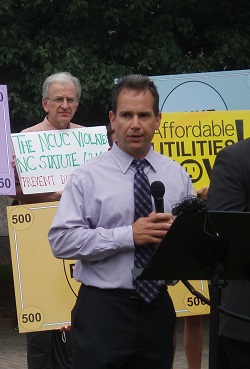
Steve Hahn of AARP North Carolina
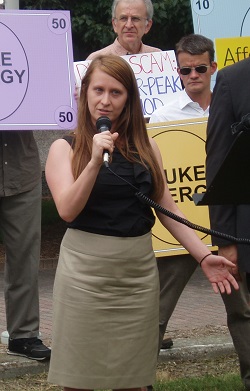
Monica Embrey of Greenpeace
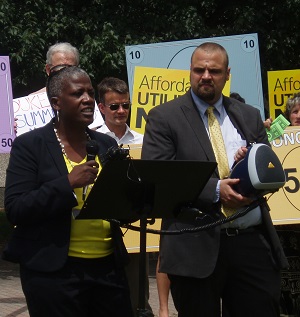
Satana Deberry of the N.C. Housing Coalition addresses the Ratepayers Assembly as Nick Wood looks on
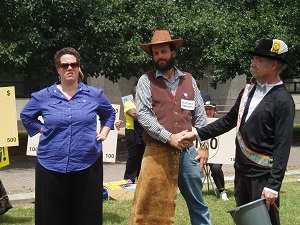
NC ratepayers are not amused at the cozy relationship between the Straw Man Sheriff (NC Utilities Commission) and the Duke Energy monopoly…
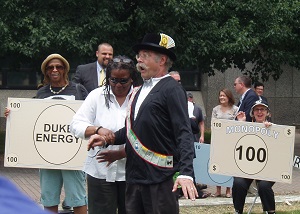
…but once the crowd gets deputized to put things in order, Monopoly Man is soon hauled off to jail
Recent News
Regulators Must Reject Duke Energy’s Two “Buried Treasures” — NC WARN News Release
Attorney General among critics of gold-plated, wasteful grid projects and attacks on non-residential solar buried in separate rate case; a ruling is forthcoming Duke Energy Carolinas sought an approval short-cut by hiding $170 million in over-priced grid projects under thousands of pages in a mostly unrelated rate-hike case. It did …
SEE ALL Rate Cases POSTSNC WARN Denounces Duke Energy Carbon Plan — Statement from NC WARN
With their new carbon plan, Duke Energy leaders remain on a rate-hiking, climate- and community-wrecking track for North Carolina. The solar they propose would be built many years from now – if ever – and too late to help the climate crisis.
SEE ALL Rate Cases POSTS